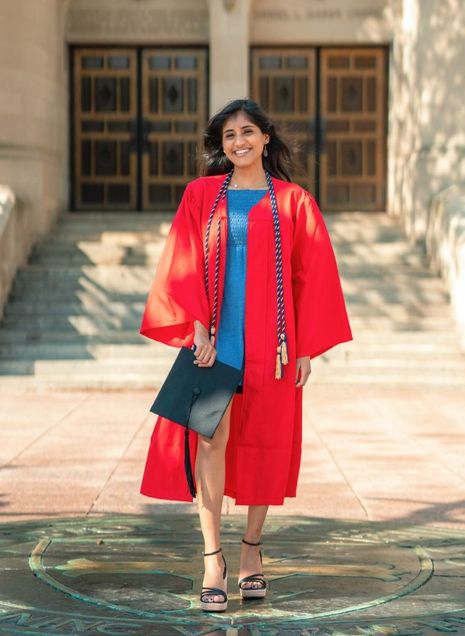By Abby Hagen (CAS’23)
 Sabrina Ghosh (CAS’21) is one of 23 United States citizens to receive the prestigious 2023 Gates Cambridge Scholarship, which offers approximately 80 scholarships each year for students from outside the United Kingdom to pursue a postgraduate degree in any subject available at the University of Cambridge.
Sabrina Ghosh (CAS’21) is one of 23 United States citizens to receive the prestigious 2023 Gates Cambridge Scholarship, which offers approximately 80 scholarships each year for students from outside the United Kingdom to pursue a postgraduate degree in any subject available at the University of Cambridge.
Ghosh, who majored in Neuroscience, will be entering a PhD program in pharmacology, where she plans to explore the changes that happen to aging human cells by using models of accelerated aging. She hopes to dedicate her life to researching and treating aging-related diseases.
“My undergraduate research was strengthened by an entire community of friends, peers, and mentors at CAS and BU, who supported my journey to the Gates Cambridge Scholarship and my PhD today,” she said.“The Gates Cambridge Scholarship, which brings together students who strive to be leaders committed to improving the lives of others, was the perfect fit.”
Gates Cambridge was established in 2000 following a donation of $210M from Bill and Melinda Gates. The trust has funded 2,100 scholarships for students from 112 countries since the program’s inaugural class in 2001. This year, Ghosh was one of 77 accepted applicants, demonstrating leadership potential, outstanding intellectual ability, and a commitment to improving the lives of others. The last recipient from Arts & Sciences was Gwendolyn Pyeatt (CAS`21).
During her four years as an undergraduate at CAS, Ghosh conducted neuroscience research at the Center for Regenerative Medicine at BU’s School of Medicine, where she began her research on aging-related diseases. She wrote a senior thesis on the impact of aging-related misfolding proteins on diverse cell types throughout the body.
While shadowing doctors at Boston Medical Center, Ghosh was able to see the same aging- related diseases she was studying in the lab being treated, but it was her volunteer work at senior centers and hospitals throughout the COVID-19 pandemic that truly put the impact of her research into a broader perspective.
“I was quickly learning that my scientific pursuits could have widespread implications on the health of an aging society,” says Ghosh, “It became important for me to shape a career in science where I could be a part of these intellectual, social, and political conversations and influence policy and health at the local and global level.”
Ghosh says her global perspective on science and medicine was enhanced by CAS’s diverse environment and educational opportunities. She was able to explore different interests, skills, and passions unrelated to her coursework in the sciences, even pursuing a Cinema and Media Studies minor alongside her research.
Outside of her studies, Ghosh was able to build community, gain confidence, and reflect on her role as a scientist and leader through her volunteerism and BU’s pre-professional cinema fraternity, Delta Kappa Alpha.
“It was through these opportunities at BU that I became more confident in myself and my goals to become an empathetic and multifaceted scholar and scientist,” she says, “My friends, peers, and mentors in and outside of the Neuroscience Department encouraged, inspired, and challenged me. They taught me how to blend my own values and intellectual curiosity with public service and a diversified education.”